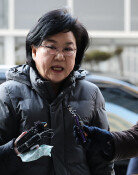Ethical Lapses, Weak Controls at the KDB
Ethical Lapses, Weak Controls at the KDB
Posted May. 22, 2007 03:22,
Mr. K was a branch manager of Korea Development Bank (KDB, one of Koreas state-run banks.) He hid himself after losing billions of won. He borrowed the money from the people around him for investment but failed to pay it back.
After this newspaper reported his story, there has been mounting criticism against the lack of a proper system to regulate workers at state-run banks. Some point out that the inspection system is not strong enough to prevent bankers from illegally using insider information for investment. Therefore, they say, what we need is a complete overhaul of the insider control system of state-run banks.
After the scandal happened, the Korea Development Bank has been busy with damage control, sending a special manager who takes charge of inside control to the branch on May 21.
Koreas three state-run banks are the Korea Development Bank, Export-Import Bank of Korea (Korea Eximbank) and Industrial Bank of Korea (IBK). They set the code of conduct for inside control of banks.
Each bank has regulations to prevent illegal investment by bankers: transaction using job related information is limited, says the KDB. Investment using insider information is not allowed, says the Korea Eximbank. Insider trading is not allowed, says IBK.
The provisions are to prohibit bankers from taking advantage of job-related information to deal stocks and invest in real estate.
However, even though there are such regulations to stop illegal behavior, virtually no systems are established to check whether the bankers comply with the regulations. Regular inspections can find out what an employee has invested in when he transacts under his name, but cant when he does under an alias.
The way to deal with the scandal is also problematic.
After Mr. K ran away, KDB started to check what he did in office when he was a branch manager this year and a senior trust manager last year.
The investigation focused on whether the scandal was related to his job and caused damage to the bank. The state-run bank concluded that It was a personal case, saying, The branch manager never made any decisions which affected stock investment and never appropriated any bank money.
But they cant find out whether Mr. K used information on real estate for investment and whether he utilized insider information, not job-related information. Mr. K was in charge of businesses related to real estate financing.
Some point out that the lack of a proper regulation system led to the scandal and, therefore, similar cases will happen again.
In fact, the KDB experienced a similar scandal in 2004. A worker in the Capital and Markets Department borrowed 5.8 billion won from 110 coworkers and relatives and invested in stocks, futures and options. But he lost almost everything and hid himself afterwards.
After the scandal, the KDB imposed tougher inside controls, fired 8 senior managers who were involved in the scandal, and blocked access to stock trading websites in the office.
But those measures cannot prevent another scandal from happening. Thats why the KDB is embarrassed.
After the scandal was reported by this newspaper, the KDB said, It is regrettable that such a scandal broke out. As punishment, KDB dismissed Mr. K and decided to position 40 inspectors in branches all around the country.
The Seoul Eastern Prosecutors Office said, We banned Mr. K from leaving the country immediately as the damages were huge. Five accusers claimed 3 billion won of damages and victims who dont participate in the legal action (such as his college classmates and friends) are likely to suffer enormous damages.
The Financial Supervisory Service said, Though we dont have any plan now, we could conduct a special inspection of the KDB if necessary, according to the investigation results by the KDB and prosecutors.
legman@donga.com hyejin@donga.com



![반찬통 착색 고민 끝…‘두부용기’ 버리지 말고 이렇게 쓰세요 [알쓸톡]](https://dimg.donga.com/c/138/175/90/1/wps/NEWS/IMAGE/2026/01/09/133126593.3.png)

![“생수병, 버리지 말고 자르자”…주방 밀폐 용기 끝판왕 [알쓸톡]](https://dimg.donga.com/c/138/175/90/1/wps/NEWS/IMAGE/2026/01/06/133101939.3.png)

